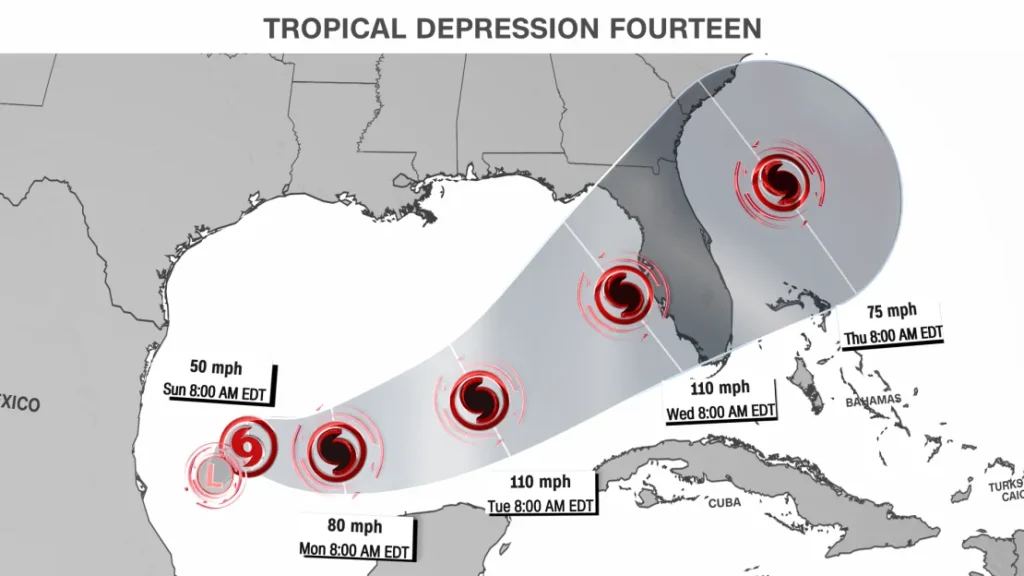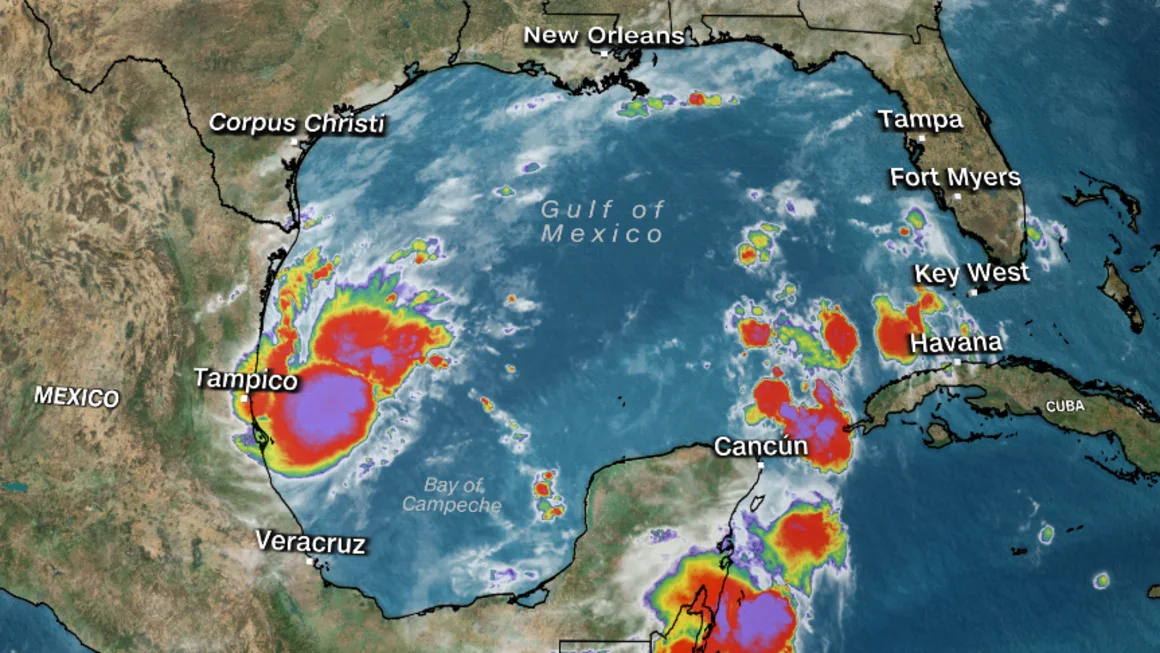| In Short |
| Tropical Depression in the Gulf of Mexico has intensified into Hurricane Milton, threatening Florida’s Gulf Coast. |
| Florida authorities have issued warnings and prepared shelters as the hurricane is expected to bring heavy rainfall, flooding, and strong winds. |
| Governor DeSantis and emergency management teams have urged residents to prepare by securing their homes and stocking up on essentials. |
| Meteorologists predict up to 8-10 inches of rain and storm surges up to 5 feet in certain areas. |
| Federal agencies, including FEMA, are closely monitoring the storm’s impact, with concerns about disruptions to Gulf energy production. |
In a developing weather situation, what started as a tropical depression in the Gulf of Mexico has rapidly intensified into Hurricane Milton. As the storm gains strength, Florida’s Gulf Coast is on high alert, with meteorologists predicting severe weather, including heavy rainfall, potential flooding, and strong winds. With the hurricane season far from over, Milton’s progression has caught the attention of both state officials and residents, who are preparing for possible landfall within the next few days.
The Formation of Hurricane Milton: From Depression to Destruction
What began as a relatively mild tropical depression over the warm waters of the Gulf has quickly morphed into a more dangerous storm system. The warm sea temperatures have provided the perfect conditions for the storm to strengthen, pushing it to hurricane status. As of the latest reports, Hurricane Milton has reached sustained wind speeds of 80 mph, with forecasts suggesting further intensification in the coming hours.
Hurricane specialists are closely monitoring the storm’s path, with computer models indicating a likely landfall somewhere along Florida’s Gulf Coast. Coastal areas from Pensacola to Tampa are being advised to prepare for potential impacts, including high winds, storm surges, and torrential rains that could lead to flash flooding.
Florida’s Gulf Coast Prepares for Impact
Local authorities across Florida’s Gulf Coast have already begun issuing warnings to residents and tourists in the affected areas. Emergency management teams are urging people to stock up on essential supplies, secure their homes, and, if necessary, evacuate flood-prone areas.
The Florida Division of Emergency Management has activated response teams to deal with potential emergencies. Shelters are being prepared, and the National Guard has been put on standby to assist with evacuation efforts if required.
Governor Ron DeSantis has addressed the public, emphasizing the importance of preparation, stating, “We cannot afford to take this storm lightly. Hurricane Milton poses a serious threat, and we urge all residents to take the necessary precautions to protect themselves and their families.”
Potential Risks: Storm Surge, Flooding, and Strong Winds
The primary concerns surrounding Hurricane Milton are heavy rainfall and potential flooding, particularly in low-lying coastal areas. The National Weather Service (NWS) has issued flood watches for parts of Florida, predicting that some areas could receive up to 8-10 inches of rain over the next 48 hours. In addition to flooding, storm surges could reach up to 5 feet in some areas, putting homes and businesses along the coast at significant risk.

Meteorologists are also keeping a close eye on the possibility of strong winds that could down trees and power lines, causing widespread outages. The hurricane is currently moving at a relatively slow pace, which could result in prolonged exposure to dangerous weather conditions for affected areas.
Hurricane Milton and the Broader Hurricane Season
Hurricane Milton is the latest in a series of tropical systems to develop during this active hurricane season. Weather experts have been warning about the potential for above-average storm activity this year, due to favorable conditions in the Atlantic and Gulf of Mexico. While Milton may not yet rank among the most powerful hurricanes, its potential to cause significant damage remains high.
With several weeks still remaining in the hurricane season, the development of Milton has heightened concerns about the readiness of coastal states to handle additional storms. Experts are urging residents in hurricane-prone areas to remain vigilant and stay updated on the latest weather advisories.
US Federal Response and International Concern
In addition to Florida’s state-level preparations, the federal government is also closely monitoring the situation. FEMA (Federal Emergency Management Agency) has already mobilized resources to assist with potential disaster recovery efforts. Meanwhile, President Joe Biden has received regular updates on the storm’s progression and has expressed concern over the potential damage it could cause.
Biden has been particularly mindful of the storm’s potential impact on oil production and energy supplies in the Gulf, which could have ripple effects on fuel prices both domestically and internationally. The Gulf of Mexico is a key hub for offshore oil and gas platforms, and a direct hit from Hurricane Milton could disrupt production, leading to shortages or price spikes.
Advice for Residents: Preparing for the Storm
As Hurricane Milton approaches, authorities have provided a list of guidelines for residents to ensure their safety:
- Stock Up on Essentials: Ensure that your household has enough food, water, and supplies to last at least three days in case of power outages or supply chain disruptions.
- Secure Outdoor Items: High winds can turn unsecured objects into projectiles. Be sure to secure or bring inside any outdoor furniture or equipment.
- Know Your Evacuation Route: Familiarize yourself with local evacuation routes in case authorities issue mandatory evacuations for your area.
- Stay Informed: Follow local weather reports and heed any advisories or warnings issued by authorities. Have a battery-powered radio or backup power for your devices in case of outages.
- Prepare for Power Outages: Charge your phones, keep flashlights ready, and make sure you have extra batteries on hand.
The Path Ahead for Hurricane Milton
As Hurricane Milton strengthens in the Gulf of Mexico, Florida’s Gulf Coast is preparing for the worst. With potential impacts ranging from heavy rain and flooding to destructive winds and storm surges, the storm’s progression will be closely monitored in the coming days. Residents are urged to take precautions now to ensure their safety as Milton approaches. The eyes of the nation—and the world—are now on Florida, as it braces for yet another bout with Mother Nature.
For Latest News Updates Click Here
